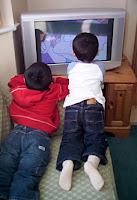 A preschooler's risk of obesity jumps 6% for every hour of TV watched per day, 31% if the TV is in their bedroom. The average American child sees 40,000 commercials, each year, on broadcast TV. By the time a child is 18 years old, he or she will witness on television (with average viewing time) 200,000 acts of violence including 40,000 murders. Teens consider musicians their heroes more frequently than athletes and rate the influence of music higher than religion or books. Plus, 44% of children and teens report watching different programs when their parents are not around.
A preschooler's risk of obesity jumps 6% for every hour of TV watched per day, 31% if the TV is in their bedroom. The average American child sees 40,000 commercials, each year, on broadcast TV. By the time a child is 18 years old, he or she will witness on television (with average viewing time) 200,000 acts of violence including 40,000 murders. Teens consider musicians their heroes more frequently than athletes and rate the influence of music higher than religion or books. Plus, 44% of children and teens report watching different programs when their parents are not around.These facts from Common Sense Media and the National Institute on Media and the Family just show how much the media affects people in their daily lives, especially kids. Children are surrounded by all kinds of media outlets on a daily basis: internet, television, music, movies, and much more. This world is constantly becoming more media s aturated every day, as people continue to rely on the media for their information and entertainment.
aturated every day, as people continue to rely on the media for their information and entertainment.
And while media technology continues to develop, education on how the media affects people is not spreading quite as rapidly as it should. Children of all ages are especially being targeted to expand their media usage, since they have grown up with this technology, but they are not being educated on how to use the media properly and how to interpret what they are exposed to every day. Many children mistake the media world as reality. In order to make sound and safe choices when considering the media and what it means for them, children need to be taught what they should believe and what they should be critical of when dealing with the media.
According to the Department of Health and Human Services: Centers for Disease Control and Prevention...
Children of all ages need to be educated to become more media literate. As technology improves, these kids will continue to be more and more exposed to a media saturated culture, so it's important for the schools and for the parents to teach their children how to deal with the media.
 aturated every day, as people continue to rely on the media for their information and entertainment.
aturated every day, as people continue to rely on the media for their information and entertainment.And while media technology continues to develop, education on how the media affects people is not spreading quite as rapidly as it should. Children of all ages are especially being targeted to expand their media usage, since they have grown up with this technology, but they are not being educated on how to use the media properly and how to interpret what they are exposed to every day. Many children mistake the media world as reality. In order to make sound and safe choices when considering the media and what it means for them, children need to be taught what they should believe and what they should be critical of when dealing with the media.
According to the Department of Health and Human Services: Centers for Disease Control and Prevention...
The early years of a child's life are crucial for cognitive, social and emotional development. Therefore, it is important that we take every step necessary to ensure that children grow up in environments where their social, emotional and educational needs are met.This is especially true for young children, but parents also should be concerned about their young teens' exposure to the media. During that time, children are experiencing a struggle between independence and dependence. Young teens will surf the web, listen to music and watch TV without much supervision by their parents. While many parents do trust them to make good decisions, these early adolescents need the tools to understand and to analyze media messages in this media saturated world.
At this age, teens make more of their own choices about friends, sports, studying and school. They become more independent, with their own personality and interests (The Department of Health and Human Services).One major problem that these young teens face revolves around the social scene. This group is especially being sucked into the world of MySpace and Facebook to meet friends and to interact with people their age, therefore creating a sense of isolation from society. Most of MySpace's almost 50 million users are under the age of 22 (National Institute on Media and the Family). These children will sit for hours on the computer every day, and there's no guarantee that people are who they say they are on these Web sites. It's scary.
Children of all ages need to be educated to become more media literate. As technology improves, these kids will continue to be more and more exposed to a media saturated culture, so it's important for the schools and for the parents to teach their children how to deal with the media.








